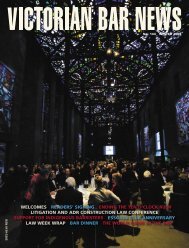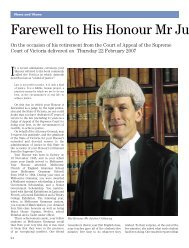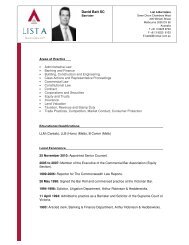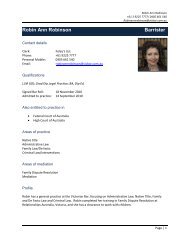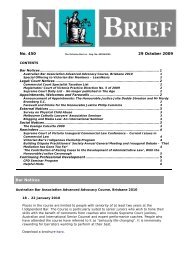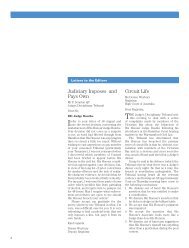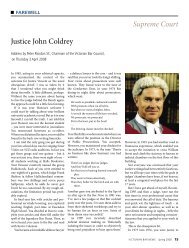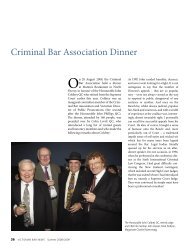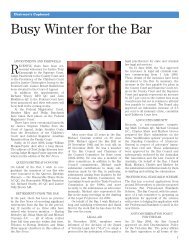News and ViewsWomen <strong>Bar</strong>risters Talk:Hearts and Minds, theNext StepSpeech by the Honourable <strong>Justice</strong> Marcia Neave <strong>AO</strong>at the WBA Anniversary Dinner held on Thursday23 November 2006.THANK you so much for inviting meto speak at the Women <strong>Bar</strong>risters’Dinner. This is the second time Ihave had that honour. Although I wasnever a barrister I have been involvedwith the Women <strong>Bar</strong>risters’ Associationin many ways in the past. In 1998 I wasa member of the Steering Committeechaired by <strong>Justice</strong> Stephen <strong>Charles</strong>, whichoversaw the production of the Report onEquality of Opportunity for Women at the<strong>Bar</strong>.That Report interviewed women barristersabout their experiences, examinedthe briefing practices of law firms and collectedstatistics on women barristers inthe superior courts. It provides a valuableyardstick for measuring the progress ofwomen at the <strong>Victorian</strong> <strong>Bar</strong> over the pasteight years.In my speech at the 2001 Women<strong>Bar</strong>risters’ dinner I looked at the waysin which the historical over-representationof men in the legal profession hadshaped the nature of law and the waysthe law had, in turn, reflected and shapedsocial attitudes about the role of men andwomen. I argued that law traditionallyreflected the perception and reality of menand that women’s disadvantaged positionin society was unlikely to be recognisedand addressed by law unless there weresignificant increases in the number ofwomen at senior levels in the profession,including women judicial officers, seniorpractitioners and law reformers.The Attorney-General was present atthe Women <strong>Bar</strong>risters’ dinner in 2001,when I argued for the appointment ofgreater numbers of women judges. I canassure you that it never entered my mind64then that I might be considered for judicialoffice myself. I want to congratulate himon the improvements to the gender balanceof the judiciary which have occurredover the past five years.Ten years ago <strong>Justice</strong> RosemaryBalmford, whom we are honouringtonight, was the only woman SupremeCourt judge in Victoria. Today nearly 15per cent of Supreme Court judges, 1 35 percent of County Court judges 2 and 34.26per cent of magistrates are women. 3 Theimprovements in Victoria may be contrastedwith the rather disappointing figuresfor the federal magistracy, to whichonly 18.5 per cent of women have beenappointed since that judicial office wasestablished in 1999. 4Other figures about the composition ofthe legal profession are less encouraging.For some years now 50 per cent or more oflaw graduates have been women, but thisis not reflected in the gender compositionof the <strong>Bar</strong> or of law firms at senior levels.It is ironic that the proportion of womenbarristers (21 per cent) 5 is now lower thanthe proportion of women County Courtjudges and magistrates. The majority of<strong>Bar</strong> Readers in the last intake were men.I also note that only 7 per cent of silks arewomen. 6 These figures may have declineda little because of recent appointments tothe Bench, but they are very low.The recently released GenderAppearance Survey, 7 indicates unsurprisinglythat women make up a minority ofthe counsel appearing before any judicialofficer. There is also evidence that theparticipation of women has declined inmore senior or complex matters. Evenmore disturbing was the finding that inthe Federal Court, the average length ofhearing for a male who was junior to seniorcounsel was 223.6 hours, whereas fora female junior counsel in the same position,it was 1.4 hours.Unfortunately we still see relativelyfew women barristers in the Court ofAppeal, and very often they do not havespeaking parts, although those who do areextremely capable.A recent report by the Law Institute ofVictoria 8 surveyed firms of different sizesto determine their composition and workinghours. Large firms were more likely tohave women partners, but proportionallylarge firms did not have more womenpartners than small firms. Of the 39 firmswith between four and 20 partners, onlytwo firms had three women partners andno firm had more than three. The Reportconcluded “women at partnership levelin <strong>Victorian</strong> firms are a minority”. In thecommercial arena the world looks a littlebrighter for women. It was reported inLawyers Weekly that while there wereslightly fewer women working in-house, 9than in firms, 30 per cent of senior positionsin-house were held by women. 10The figures I referred to above are notpeculiar to the legal profession. For feminists,academics and activists who haveworked on issues of gender equality formany years, they are part of a familiar pattern.Women have certainly made somegains, but improvements are patchy andwomen still face significant obstacles in anumber of areas.On the one hand women are clearlybetter off than we were 50 years ago.Women are now more prominent participantsin political life and civil society,
Judge Judith Cohen, <strong>Justice</strong> Rosemary Balmford and <strong>Justice</strong> Marcia Neave.although the majority of senior positionsin academia, the law and commerce andindustry are still occupied by men. Thisyear the enactment of the <strong>Victorian</strong>Charter of Rights and Responsibilitiesformally recognised the right to equalitybefore the law. The Equal OpportunityAct makes it unlawful to discriminatein areas such as education, employmentand the provision of goods and serviceson the grounds of gender, pregnancy andmarital status. The criminal law principleswhich treated women as unreliable witnessesin sex offence cases were repealedmany years ago. Recent reforms to sexualoffences laws based on recommendationsmade by the <strong>Victorian</strong> Law ReformCommission will make it less stressful forcomplainants in sexual offence cases togive evidence. 11 Violent men who kill theirpartners are no longer able to rely on thepartial excuse of provocation. 12 The highincidence and terrible human cost of familyviolence is better recognised and thereare now more remedies for women whoare assaulted by their partners.On the other hand there is still a substantialgap between the rhetoric and thereality of gender equality, both at the <strong>Bar</strong>and in the broader workforce. Comparedto many other women, barristers are awell educated and privileged group, butthe patterns of gender segmentationwhich exist in the general workforce areapparent at the <strong>Bar</strong>, where women areunder-represented in the senior ranks ofthe profession. While I do not have figureson the comparative earnings of male andfemale barristers, I think it is highly likelythat women barristers generally earn lessthan their brothers. Again this reproducesthe position of women in the broader community.Women barristers, like their sisters inother parts of the workforce, still find itdifficult to achieve a satisfactory balancebetween family and work responsibilities,particularly if they are single parents.In the general community women areover-represented among victims of familyviolence and sexual assault. Familyviolence is not a class-based phenomenonand I would be prepared to bet that thereare some women at the <strong>Bar</strong> who have hadto deal with this issue personally. Manyyears ago I participated in a seminar onfamily violence attended by a numberwomen who were senior members of thelegal profession. After the seminar I wastold by three women present that theyhad been the victims of violence earlierin their lives.The issues which women barristersconfront reflect the strategic dilemmasfaced by women in the whole community.Broadly the question we need to consideris “Where do we go from here”?At this point in history we may beapproaching the outer limits of the lawas an instrument for improving the livesof women.Areas where legislative reform is obviouslyneeded have been identified andlargely addressed. Apart from industrialrelations changes which make it easier forwomen to combine paid work and familyresponsibilities — which are not on thehorizon at the moment — I do not thinkthat legislative reform is likely to deliversignificant gains for women in the future.Procedural and administrative changescan also improve the position of women— particularly women from disadvantagedsections of the community. The changesto procedures in sex offence cases and theestablishment of specialist family violencecourts are recent examples. But again Ithink that such changes will have limitedcapacity to address the complex questionsof gender inequality which are likely toarise in the future.Common law changes have alsoimproved the position of women in thepast. Developments of constructivetrusts principles to enable women in defacto relationships to claim an interest inproperty owned by their partner are oneexample of doctrinal changes which havebenefited women. Another was the abandonmentof the common law principle thata man cannot rape his wife, which surviveduntil 1991. 13 Though courts are notlaw reform bodies, the changing compositionof the judiciary is likely to result inbetter understanding of how rules whichare apparently gender neutral may have adifferent impact on men and women.In the past women looked to lawreform to improve their position. I haveargued that legislative changes and commonlaw developments are now less likely65



